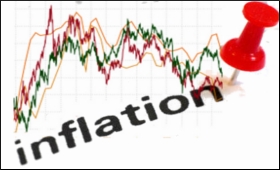|

|
Economy not yet bottomed out
|
|

|
|
| Top Stories |
 |
|
|
|
Bikky Khosla | 17 Dec, 2013
The GDP figures released last month sent out some soothing signals, showing our economic growth at 4.8 percent in the second quarter. Together with this better-than-expected growth, the sharp fall in current account deficit to $5.2 billion for the period on the back of healthy export growth sparked hope of a faster economic recovery and a possible rate cut in the RBI's forthcoming monetary policy. But two recent sets of economic data released last week put a sudden dampener on all this enthusiasm.
First, the retail inflation for November rose to 11.24 percent on the back of high food prices, and this raised wide expectation -- which was further bolstered by yesterday's wholesale inflation data showing a 7.52 percent spike in November -- that the RBI would increase interest rates in its mid-quarter monetary policy review on Wednesday -- a move that would certainly hurt the growth prospects further. In fact, the RBI Governor already indicated that a rate hike was in the pipeline, and this means credit is also going to be costlier in the coming days.
Second, the bleak October factory output data came on the top of the dismal retail inflation data -- the IIP slumped 1.8 percent in the month despite festival related demand, against 2 percent growth in the previous month and 8.4 percent in the corresponding month of last year. These figures show how important it is at this moment to lower the lending rates for the industry, but unfortunately as long as inflation remains above the concern level, nothing much can be expected from the central bank.
I appreciate RBI's concern over inflation, but at the same time I am of the view that the central bank should try to leave the growth prospects unscathed as much as possible and focus should be shifted to growth as soon as inflation calms down. In addition, I think that seasonal factors can have only a short-lived influence on food prices and what is more important is to address the structural challenges, such as inefficiency and bottlenecks in agricultural supply chain to reign in food inflation, which has often turned out to be the main driver of our overall inflation. In addition, fiscal discipline and investment also hold the key.
As far as export is concerned, it is quite satisfactory to see that the sector is leading the economy from the front, but it is unfortunate that our exporters are still suffering from some lingering challenges in the form of high transaction costs, delay in subsidy clearance, bureaucratic hurdles and infrastructure bottlenecks. In addition, I want to reiterate that the manufacturing industry needs urgent attention. India needs a long-term comprehensive plan to boost manufacturing not only to increase manufacturing-led exports but also to reduce its reliance on high-end imports.
I invite readers' feedback.
|
|
|
| |
|
|
|
|
|
|
|
Indian Economy
Sethu Ratnam, uk | Wed Jan 15 17:40:27 2014
Eradiction of the unholy nexus of politicians, bureaucrats and middlemen, and the black money would reduce the inflation. Further , system improvements in all sector ministries would also help. But the big question is "WHO WILL DO IT"!MY EXPERIENCE OVER SEVERAL DECADES IS NO ONE WOULD AGREE TO DO IT. What PITY?

Food export
Madhukar Takbide | Fri Dec 27 18:35:16 2013
Govt has to take some plan to bust the agriculture base export.
These should be some system to reduce delay in subsidy clearance.
And firm plan to face high transaction costs,bureaucratic hurdles and infrastructure bottlenecks.

Economy and Indian exports to the UK
Stan Ratcliffe - CHIPnTRAC | Wed Dec 18 16:50:00 2013
UK small business, which are a significant percentage of the GDP, are put off dealing with Indian firms because the price per unit of small orders, 5 or 10 units, is no lower than the single unit price advertised by those Indian companies direct to UK customers on e-bay.
There is no profit in such deals for UK small businesses.

Inflation
A P Sensharma | Wed Dec 18 11:40:28 2013
Sir,
This is the outcome of the lack of vision among the so called NETAS of India. The inflation is purely due to lack of supply, hoarding of commodities and short term gain targeted by the unholy nexus of politicians, bureaucrats and middlemen.

|
|
|
|
|
|
|
| |
| Customs Exchange Rates |
| Currency |
Import |
Export |
US Dollar
|
84.35
|
82.60 |
UK Pound
|
106.35
|
102.90 |
Euro
|
92.50
|
89.35 |
| Japanese
Yen |
55.05 |
53.40 |
| As on 12 Oct, 2024 |
|
|
| Daily Poll |
 |
 |
| Do you think Indian businesses will be negatively affected by Trump's America First Policy? |
|
|
|
|
|
| Commented Stories |
 |
|
|
|
|
|
| |
|